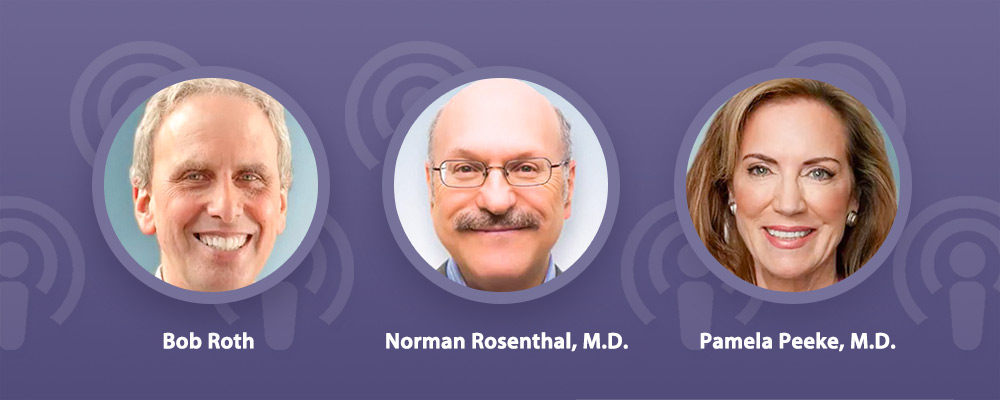Two physicians at the top of their fields, Dr. Norman Rosenthal and Dr. Pamela Peeke, address healthy living and the science behind the Transcendental Meditation® (TM®) technique that supports it in an in-depth interview with Bob Roth, CEO of the David Lynch FoundationSM and a veteran TM teacher, on his Sirius XM radio show, “Success Without Stress.”
“There are now two studies that show that your chances of getting a heart attack or a stroke within the next 10 years are reduced by about 25 percent if you meditate.” —Norman Rosenthal, M.D.
Dr. Rosenthal, Clinical Professor of Psychiatry at Georgetown University Medical School, is the world-renowned psychiatrist and author whose research on seasonal affective disorder (SAD) has helped millions of people. His 2011 book, Transcendence was a New York Times bestseller, and his book The Gift of Adversity was a Los Angeles Times bestseller. His latest book is Super Mind: How to Boost Performance and Live a Richer and Happier Life through Transcendental Meditation.” There are now two studies that show that your chances of getting a heart attack or a stroke within the next 10 years are reduced by about 25 percent if you meditate,” he says.
“If you did take 20 minutes to meditate first thing in the morning, you would have fewer things on your to-do list, and the ones that were left, you’d do better.” —Pamela Peeke, M.D.
Dr. Pamela Peeke, Assistant Professor of Medicine at the University of Maryland School of Medicine, adjunct senior scientist at the National Institute of Health, and Chief Medical Correspondent for Discovery Health TV, is an internationally recognized physician, scientist, and best-selling author in the fields of nutrition, stress, fitness, and public health. Her books include The Hunger Fix, Body for Life for Women, Fight Fat after Forty, and Fit to Live. “If you did take 20 minutes to meditate first thing in the morning, you would have fewer things on your to-do list, and the ones that were left, you’d do better,” says Dr. Peeke.
The questions they discuss include:
- What is TM and how does it work?
- Are all meditation techniques the same?
- What happens in the brain during TM practice?
- How can TM help with addictions?
- What is the difference between TM and mindfulness?
Learn more about the David Lynch Foundation ►
Please note: Our intention is to provide general educational information. The information in this article and podcast is not intended to be personal medical advice, nor should it be used as a substitute for medical advice, diagnosis, or treatment.
Podcast: Play in new window | Download
Subscribe: RSS


Comments
You May Also Like
Creativity & the Arts
David Lynch and Bob Roth Talk about Life, Art, and Meditation | 1:12:14
The famed filmmaker joined the bestselling author and David Lynch FoundationSM CEO to speak to a sold-out crowd of 1,600 people in San Francisco, with a lively Q&A.
Business Success
TM, Creativity, Performance, and Stress, Part 3 | 27:49
Andrew Ross Sorkin of CNBC’s Squawk Box interviews Arianna Huffington and other leading professionals about their personal experience with the TM® technique.
TM in the News
American Institute of Stress: TM Heals PTSD | 7:47
The Dwight D. Eisenhower Army Medical Center Traumatic Brain Injury Clinic at Fort Gordon, Georgia, offers the TM® technique to Service Members and veterans.
Personal Growth
Bob Roth Interviews David Lynch on “Success Without Stress” | 49:00
TM® is "like being given a key that opens the door to that treasury (of happiness) within. Life will get better and better." —David Lynch